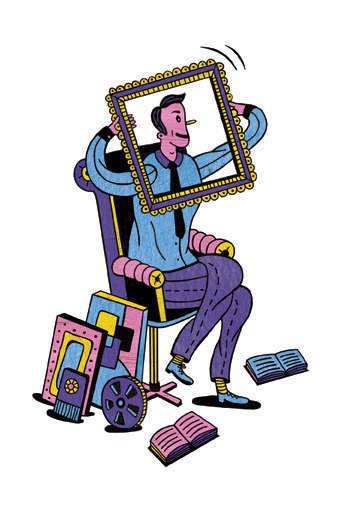
Faulty Reception The sad fact of the matter is that most of today’s TV is rubbish. Even the good stuff. Seriously, what’s wrong with this picture, asks Sam Leith

Faulty Reception
The sad fact of the matter is that most of today’s TV is rubbish. Even the good stuff. Seriously, what’s wrong with this picture, asks Sam Leith
TV IS BROKEN. We might as well admit it. I know, I know: one looks on one’s Sky box (or, in the case of HNWs, one’s Sky HD box) and channel after channel of goodies squirm to await your pleasure. But take a closer look at those goodies. Enticing as they may seem superficially, underneath the bright food dyes they’re all made of marzipan. TV is a repetition machine: it’s in a bad state.
I’m not talking specifically about the weird, retro Opportunity Knocks thing that, thanks to Simon Cowell, now takes up half the schedules; nor the even weirder ‘structured reality’ shows that take up the other half. And documentaries are their own thing, of course.
No, it’s more TV as a creative artform — in drama, essentially — that I think is up the spout. What has it produced that’s original in living memory? Three or four decades ago it looked like the coming thing. Dennis Potter, Alan Bleasdale, Phil Redmond and others were finding ways to tell stories — intimate, gritty, sometimes surreal — that were distinctly of the medium itself.

Are we seeing anything like that now? No. It has stalled. It may be the first instance of an artform being screwed by its medium. Essentially, TV needs to be sort-of popular (in a way that films, books and music don’t), so, before it was forced to go through the sort of crisis of representation that gave us modernism in the other arts, it figured out how to be just-about-OK, and stuck with it.
The basic template now for semi-serious television drama is that of HBO. There’s a marketing-led business model for it — involving multi-series syndication, season-by-season DVD boxed sets and all the rest — that places certain constraints on narrative. Each episode needs to be sort-of self-contained, but it needs a hook to drag you into the next show; every episode nests within a season-long plot arc, and it needs to leave narrative ‘outs’ for the show to be recommissioned. That’s fine: Charles Dickens and Wilkie Collins didn’t exactly operate in a cork-lined room.
But its success — you really can think of HBO ‘winning’ TV drama in the same way porn won the internet — is creating a superabundance of identi-slick vacuity. It’s creating posh hokum where European is code for classy, you wheel a big-name director in for the pilot, and nobody gives a damn if it doesn’t make sense. Its highest aspiration — and it works so, so well: I know, because I lost maybe six months of my only life on earth to the essentially inept saga of Utah polygamists Big Love — is soap operas with the production values of Hollywood movies.
Instead of being called out on this, it is by and large being given a free pass. Television still suffers, as young artforms tend to, from being overpraised: when something shows signs of not being flat lousy, enthusiasts for the medium go nuts for it. It happened to pop — Bob Dylan being spoken of as the equal of Keats, notoriously. It still happens to comics — where any piece of graphic storytelling with a quote from TS Eliot, an episode of sexual failure, and a demonstrable absence of X-Men is apt to occasion yet another ‘Comics Grow Up’ feature.
But if the sign of adolescence in a young medium is that enthusiasts find something in it to shout about, the sign of maturity is that enthusiasts feel secure enough to look its shortcomings in the eye. It bears criticism on a level with other artforms because it has the expressive range, and enough talented practitioners working in it, that nobody feels it needs any special pleading. It has earned its place at the table — and, like a serious artform, it attracts critics rather than cheerleaders.
LOOKING AT TELLY at the moment, I’d say we’re arrested in the cheerleader phase. Oddly, that has been camouflaged by the fact that, at least in the UK, TV criticism is the province (as pop criticism was when I was a teenager) of some of the sharpest writers in the business. But by and large they are set up in a brickbats-or-bouquets format: TV is treated as the occasion for funny writers to be funny.
When it’s time to be serious, the rigour you’d expect in the consideration of other artforms vanishes. Take the two most publicly admired drama series of recent times: The Killing and Homeland. The former was a cynical red-herring machine in which neither the commission of the crime nor its cover-up made even the most elementary practical or psychological sense. The latter, again, didn’t court the willing suspension of disbelief so much as cock-knock the face of plausibility with a smug grin.
So what, you might say: two overhyped shows turned out to be a bit rickety. I give you that. And of course, good TV drama exists (even as Downton Abbey is held, God help us, to be the TV equivalent of golden-age Merchant Ivory). But these are bellwethers. In toto, we’ve done next to nothing to prove the generation that thought telly was a waste of intellectual effort wrong. It needs a kick-start: a rescue from soupy, market-driven mediocrity. Perhaps what TV needs, after all, is patronage. Anyone up for funding a small-screen equivalent of the Abbey Theatre?






